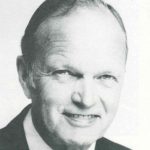Maurice Carter looked around and didn’t like what he saw. But then he took a second look and came back. Carter, a 1991 Distinguished Service Citation recipient, whose father was the first Pontiac dealer in Western Canada, surveyed the family’s auto business at the time he was making his long-time career choices and decided there were too many Carters, particularly in his Dad’s dealership. So, after serving a perfunctory stint with the assembly line of the GM Motors Plant in Saskatchewan and then with his father’s dealership, he setoff in another direction-a circuitous route which would take him first into the world of sports broadcasting and then back to cars.
Today, he owns a large General Motors dealership in Canada, and is one of the most well-known auto dealers in that sprawling country. Carter, who excelled as a sports and special events broadcaster, returned to the automobile industry for good in 1959, primarily because of his broadcasting work. “I was doing commercials for auto companies,” he recalls, “and the GM people I was working with persisted that I should take another look at returning to the industry. So I did.”
Actually, in one sense, Carter had never betrayed his love of cars. He became deeply involved in racing, and was the first Canadian to win both Trans Am and IMSA races in the United States; twice, he was named Canadian Race Driver of the Year. But when he returned to the industry as a sales manager of a large Toronto dealership-he was hooked for good. He was soon promoted to general manager, and a few years later, he purchased his present GM dealership in Hamilton from the late Emile Dubois’ family.
His career in the auto industry, which spans six decades, has been one rich with change, Carter says. “First of all, there are just more buyers for cars,” he said. “The growth of wage and earnings and the expansion of available credit has created more buyers for cars than ever before. “But the biggest change is that manufacturers have taken over the retail business with tactics such as rebates,” he continued. “Now the manufacturer is addressing the consumer directly. Consequently, the dealer’s role has changed dramatically. Now, we react. The customer comes in pre-interested, if you will. And it’s up to us to follow the rebate plans, the options packages, etc.”
Carter isn’t overly pleased with the changes, and says the dealer’s role-even five years ago-was a more challenging one. “Even just those few years ago,” he says, “it was left to the dealer to merchandise cars; if I was successful in doing that, then the manufacturer would reward me.”
Carter says salesmen, as a result, aren’t selling as hard as they used to in the past. “They can’t,” he says. “So many things are pre-packaged, it makes it difficult to deal with a customer. There’s not too much room for salesmanship.” So, Carter has made service the difference in his dealership. His consumer satisfaction program is regarded as one of the best in the industry, and includes such amenities as a shuttle bus to and from downtown to accommodate customers who need to drop off, or pick up, their cars at Carter’s dealership.
Despite the changes in selling that irritate him, Carter readily admits the auto industry has been exceedingly good to him and his family. In fact, his youngest son is a recent graduate of Northwood Institute and the NADA program, and stands ready to help his father out with the family business.
While the future is unknown, Carter says he sees much promise ahead for the auto industry. “Certainly, there are some misgivings,” he says. “For example, the major manufacturers certainly won’t disappear. But perhaps the best sign I saw for the future was when I attended my son’s graduation from the dealer academy. I looked at the graduates and saw a group of bright-eyed, intelligent, enthusiastic young people who just couldn’t wait to get into the auto industry. That’s encouraging.”
Carter is a proponent of the Automotive Hall of Fame’s Think Automotive! program, which encourages young people to consider the industry for their career choice. “For example, I see a definite shortage in technicians,” he says. “The shortage is so acute here in Canada that we’ve begun training our own. One of the causes of the shortage is the fact that in Canada, technicians must go to school four years, while in the States, only three are required. “So, we often train our own. In one of our shops, of the 22 technicians, 14 have come through our own program.”
Carter’s emphasis continues to be on customer service and satisfaction. And though he can’t sell cars in quite the method he used to, Carter has taken a page from his sports experiences, learned to play within the rules-and succeed. Too many Carters in the auto industry? It’s good for the industry that Carter took a second look and came back.
